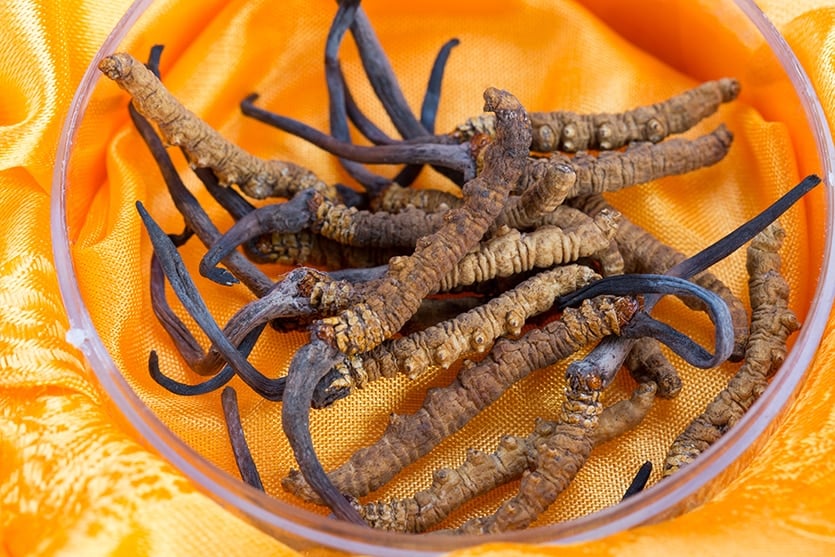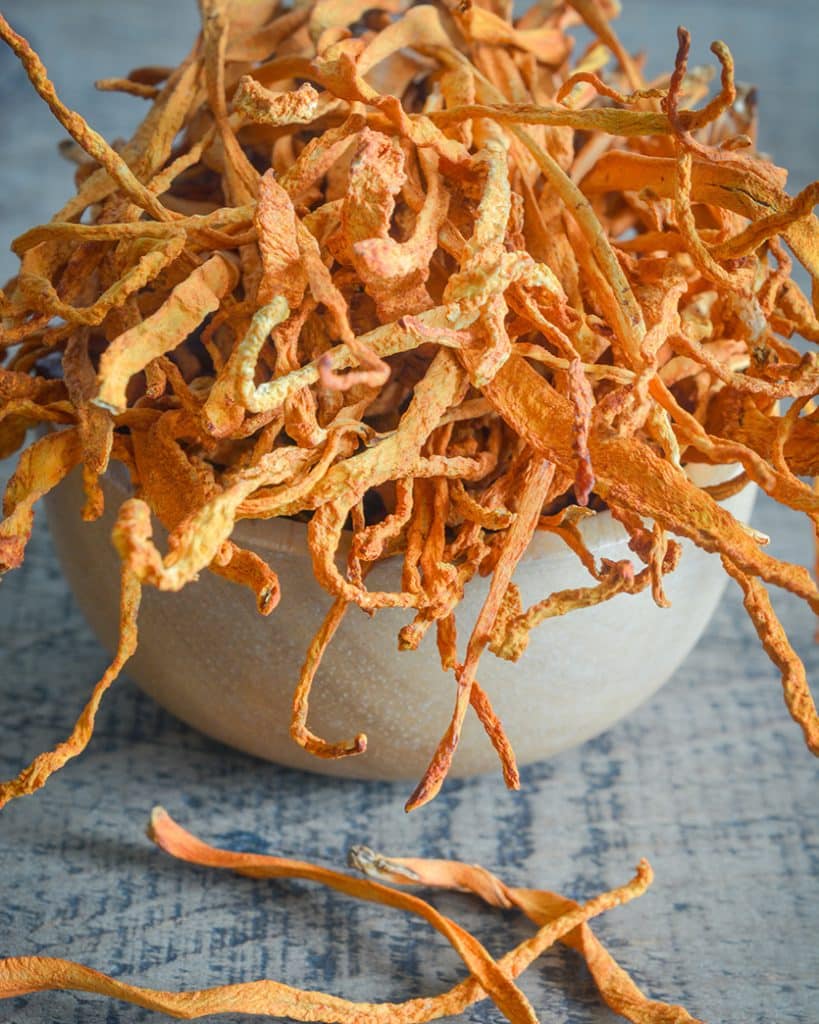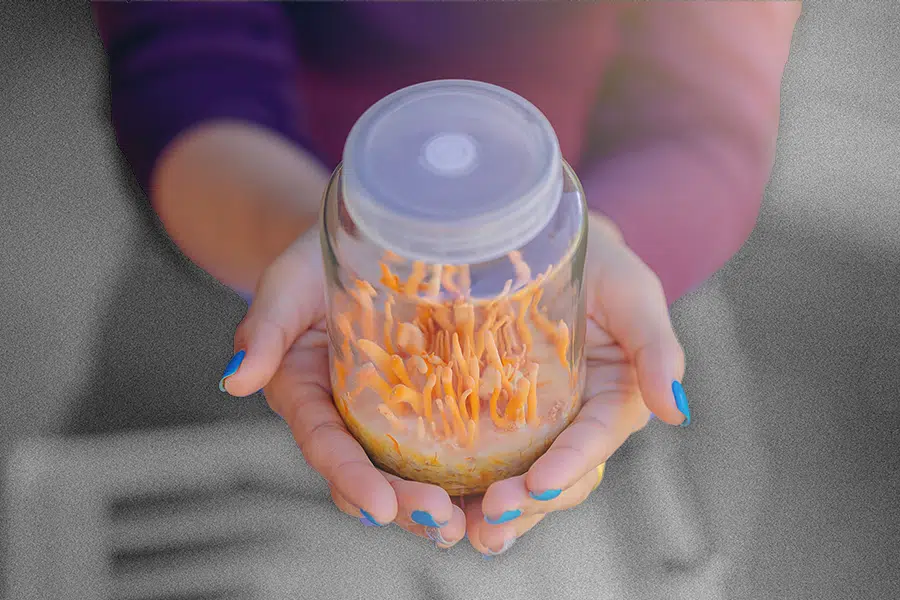The fungus family includes many fascinating and helpful species—some with stories more mind-bending than others. The crooked fingers of Cordyceps are easily disguised by powders and elixirs, stocked neatly side-by-side at the natural pharmacy. For many enthusiasts, this fungus is nothing short of impressive: It has a history of medical use that spans over 1,000 years. Yet, despite its fantastical history, the mushroom is not as innocent as it would seem. Learn all about Cordyceps mushroom benefits, side effects, and more.
What Is a Cordyceps Mushroom?
Cordyceps is a genus of fungi that includes over 400 mushroom species. But, Cordyceps mushrooms are far from typical: You won’t find this species growing on your lawn or clinging to a tree trunk. Cordyceps are parasites. These fungi infect live insects: Their mycelium replaces host tissue until the host dies. Some Cordyceps are parasitic on other fungi. The fungus bears several creative nicknames: zombie fungus, caterpillar mushroom. In the wild, Cordyceps mushrooms are a rare treat. But don’t worry—Cordyceps can not infect humans. Quite the opposite: Cordyceps are now among the most commonly used medicinal mushrooms in the United States. Select species are increasingly farmed and sold as nutritional supplements and health aids worldwide.
“Cordyceps has been used since ancient times as a healing modality and has been found in Chinese and Tibetan medical books,” says Mary Pardee, ND, a naturopathic doctor. Though it doesn’t have psychoactive properties, many consider it a medicinal mushroom—that is, a mushroom that can improve one’s health.
Read: Our Guide To Medicinal Mushrooms

The original cordyceps species to gain attention for its medicinal benefits, Cordyceps sinensis—renamed Ophiocordyceps sinensis in 2007—grows mostly in China and Tibet, but these fungi are extremely rare and expensive, says Christopher Hobbs, Ph.D., an herbalist, acupuncturist, research scientist, and author of Medicinal Mushrooms: The Essential Guide. In most of the world today, any cordyceps mushroom you can buy will be of the species of Cordyceps militaris. “You have to make sure that in the ingredient bottle, it says Cordyceps militaris,” says Hobbs. “If it says Cordyceps sinensis on it, it’s probably some other species.”
What Does Cordyceps Do?
Cordyceps has “been known and revered for many, many centuries to boost vitality and energy,” says Hobbs. “They call it a yang tonic; in other words, it boosts kind of a masculine energy in the body and maybe increases sexual vigor and the like. If you’re doing sports, for instance, and you take it as a supplement, it should give you more performance ability.”
While there are many anecdotal reports about these effects—stemming from Cordyceps’ use in Chinese medicine for over 300 years—not all of them have been experimentally verified, Hobbs adds. The most substantiated uses of Cordyceps, he says, are as an immune modulator, a protector against kidney disease, and a remedy for asthma and other respiratory illnesses. Still, it’s important to mention that in the modern medical context, Cordyceps is generally used as a supplemental remedy, not as a primary treatment for disease.
How to Grow Shrooms Bundle
Take Both of Our Courses and Save $90!
Cordyceps Mushroom Side Effects
“Cordyceps are safe for most people to take,” says Morgan Lee, a registered nurse, and licensed acupuncturist. However, since Cordyceps has the potential to relax your blood vessels and lower your blood pressure, you should check with your doctor before taking it if you use blood pressure medication. “Some people have reported symptoms of stomach discomfort, constipation, or diarrhea,” she adds.
In addition, Cordyceps may lower your blood sugar levels, so pre-diabetics, diabetics, and those on medications that lower blood sugar should monitor their blood sugar levels if they use Cordyceps, says Pardee.
Taking Cordyceps On Empty Stomach
“Because herbs are not synthesized like common prescription medications, it is best to take them on an empty stomach so that the body’s natural digestive enzymes can process and absorb them into the body easier,” says Lee. “Synthesized medications, like aspirin (derived from the willow bark tree), are already concentrated and in a bio-available form for the body to process.” If you experience stomach upset or nausea with Cordyceps, Pardee recommends taking it right before eating to prevent this issue.
Read: Why You Should Grow Your Own Mushrooms

Cordyceps Mushroom Benefits
Like many mushrooms, Cordyceps mushrooms have a long history of medical use, particularly in Traditional Chinese Medicine (TCM). History lauds Cordyceps for its energizing and stamina-building properties—but clinical science is lacking. Few large-scale trials test the medical potential of these unusual fungi in humans. Claims about Cordyceps mushroom benefits in health and medicine come from its long-held historical and cultural use and burgeoning clinical and experimental studies. Here’s what the experts had to say about this unusual mushroom:
Benefits of Cordyceps for Lungs
One of the most established benefits of Cordyceps is for the lungs. Experimental studies suggest that Cordyceps may improve cellular oxygen uptake and utilization, which can help with relief of asthma and chronic obstructive pulmonary disease, says Lee. It can also help athletes like surfers, swimmers, and runners increase their lung capacity.
One small study in the Journal of Dietary Supplementation, for example, found that people who consumed Cordyceps militaris for three weeks were able to take in more oxygen during exercise. “These individuals were also able to extend their athletic performance longer than those who did not take the Cordyceps militaris,” says Pardee.
Cordyceps Mushroom Benefits for Immunity
Another promising benefit of Cordyceps is for the immune system. Cordyceps (and other mushrooms) contain beta-glucans, which are fibers that boost the immune system and reduce inflammation in the body, says Hobbs. A small study in BMC Complementary Medicine and Therapies found that people given 1.68 grams per day of cordyceps for eight weeks had more active natural killer cells—a group of cells that fight off viruses and tumors—than people given a placebo. The study included 38 participants.
Benefits of Cordyceps for Energy
According to Lee, some studies suggest that cordyceps can help with fatigue and improve physical endurance. However, Cordyceps may not always provide energy. “Cordyceps is an adaptogen, which means it helps the body achieve homeostasis,” Pardee explains. In other words, if you’re feeling lethargic, it may help you have more energy—but if you’re feeling overstimulated, it may help you calm down. “Think of it supporting our bodies’ natural ability to make energy and support vitality, rather than stimulating the metabolism directly,” she says.
This means that it’s best not to rely on Cordyceps if you really need energy but are tired. “If you are stressed from a big project and trying to stay awake to finish the presentation due by 3 p.m. tomorrow, the adaptogen will make the body ‘adapt,’ which is going to make you tired and sleepy,” Lee explains. “This has the opposite effect of the person who wants to stay awake and finish the project. Adaptogens don’t care what you want; they care about what the body wants and needs.”
It’s worth noting that scientific research on adaptogenic plants and fungi—exactly what they are and which ones are truly deserving of the term—is murky territory. Like much of the clinical research on Cordyceps, current studies on various adaptogens are nascent. Still, many plants and fungi considered adaptogens have long histories of use in culturally-specific medical practices.
Benefits of Cordyceps for Kidneys

Cordyceps mushroom benefits for the kidneys are more well-documented than other health claims. One review of studies in the Cochrane Database of Systematic Reviews found that people with chronic kidney disease who took cordyceps had lower levels of serum creatinine, a waste product associated with kidney damage. Those who took cordyceps were also better able to clear creatinine from their bodies and had lower levels of protein in their urine (which is an indicator of disease and other problems).
“If you’re drinking or you’re taking one or more pharmaceuticals, this could be stressful on your kidneys, so cordyceps has some clinical trials showing it can help support kidney function and protect the kidneys,” says Hobbs.
Cordyceps for Anxiety
The efficacy of Cordyceps for anxiety is not super well-studied, says Pardee. However, one study in Current Developments in Nutrition found that rats under chronic mild stress were less likely to have symptoms of anxiety, like loss of appetite after treatment with a Cordyceps byproduct. In addition, a study in the Journal of Ethnopharmacology similarly found that Cordyceps militaris had antidepressant-like effects in rats. They were less likely to exhibit depressive behaviors such as lethargy when placed under stress, and their brains behaved in ways that suggested lower anxiety and depression. Still, more research is needed on humans.
Cordyceps for Weight Loss
Currently, research does not suggest that Cordyceps can directly help with weight. Still, it could indirectly help by increasing someone’s capacity for exercise through its benefits for energy and the lungs, says Lee. It could also aid in weight loss by reducing blood sugar levels and blood lipids, which helps to support healthy metabolism in the long run, says Pardee.
How Much Cordyceps to Take a Day
Unlike vitamins and minerals, there is no official recommended daily allowance for Cordyceps. Different Cordyceps products can vary in strength and quality. So, it’s always wise to follow the package recommendations or guidance from a trusted health care provider. Hobbs recommends taking three grams of powder Cordyceps per day to achieve an optimal effect. The easiest way to do this is to mix half a teaspoon into water or a smoothie twice a day. He doesn’t recommend capsules because you’d need to take around six a day to consume three grams, and liquid tinctures contain alcohol, which diminishes the immune-boosting effects of Cordyceps.
Best Time to Take Cordyceps
You are more likely to reap the benefits of Cordyceps mushrooms during the day, suggest the experts. If you’re looking to use Cordyceps for energy or to improve oxygen intake, Pardee recommends taking it in the morning. Since it can be energizing, Lee cautions against taking it later in the day if you’re easily overstimulated.
How to Grow Shrooms Bundle
Take Both of Our Courses and Save $90!
How Long Does Cordyceps Take to Work?
“While the effects of Cordyceps are built up over time, many of the studies done involving Cordyceps have shown remarkable improvements in as little as two weeks,” says Lee. Still, Pardee recommends three weeks of regular use to see effects.
Research is still limited, and reactions to Cordyceps vary. So, taking three grams of Cordyceps a day for several weeks can be a way of performing a mini-experiment on your own body to see if you experience any of the possible benefits of this herb, says Hobbs.

DoubleBlind is a trusted resource for news, evidence-based education, and reporting on psychedelics. We work with leading medical professionals, scientific researchers, journalists, mycologists, indigenous stewards, and cultural pioneers. Read about our editorial policy and fact-checking process here.

DoubleBlind Magazine does not encourage or condone any illegal activities, including but not limited to the use of illegal substances. We do not provide mental health, clinical, or medical services. We are not a substitute for medical, psychological, or psychiatric diagnosis, treatment, or advice. If you are in a crisis or if you or any other person may be in danger or experiencing a mental health emergency, immediately call 911 or your local emergency resources. If you are considering suicide, please call 988 to connect with the National Suicide Prevention Lifeline.



